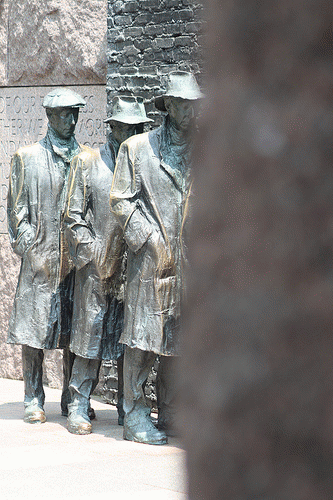Identity politics fiddled while America burned.
The passage of the Trump-Republican tax plan--along with the 40 years of increasing economic inequality in the United States--speaks to the failures and limits of identity politics in America.
Final passage of the Trump-Reagan tax plan will be among the most economically regressive policies ever passed by the American government. The combination of permanent tax cuts for corporations and temporary tax cuts for wealthy individuals (along with small temporary tax cuts for the middle class and poor), as well as the elimination of the Affordable Care Act individual mandate, the increase in the standard deduction (which will hurt non-profits), exacerbates an economic trend that has been building since the 1970s in America and which was documented by the likes of economist Thomas Piketty, the Congressional Budget Office, and a host of other agencies.
The tax plan does nothing to repatriate corporate money to the US or to repeal the laws (criticized at least since Bill Clinton) that incentivize companies to offshore jobs. It will do nothing to help the white working class who voted for Trump, instead, benefitting the top 1% and people like Trump. It is simply class warfare against the poor and middle class, but the latter are not fighting back. Why? The reason is the turn to identity politics among progressives in the last 40 years that has all but eclipsed class as a rallying and unifying principle of liberal and left politics.
Historian Louis Hartz wrote once that the weakness of class politics in America stemmed from the fact that the country lacked a feudal past. We were all born Lockean-liberal individualists with a belief that America was the land of opportunity and we could all become millionaires. Paraphrasing historian Daniel Boorstin, the genius of American politics was in creating political structures that transformed class into interest politics. While James Madison in Federalist number 10 declared that the most "common and durable source of factions has been the various and unequal distribution of property," many such as historian Charles Beard and political scientist Michael Parenti see the resulting constitution devised by the framers as insulting the minority wealthy against the tyranny of the poor majority.
Despite this class bias, traditional liberal if not real progressive politics was class-based. What was once called the Old Left drew some of its inspiration from socialist theories of class struggle. Politics was about social justice, the battle between rich and poor, and it involved labor unions, the working class, and workers. It was about fighting for economic equality and democracy, seeing political unity in the shared struggle of class. In contrast, the New Left was the politics of the 1960s. It was born in the student campus movement against the Vietnam War, and for civil rights. The New Left was less about class than about identity politics, and it had stronger middle class roots than did the Old Left. The Old Left and New Left both sought to transform American politics, yet their visions of what a revolution would look like and what would emerge were different. The Old Left saw political progress rooted in class struggle and transformation that would eventually achieve liberation for oppressed groups, the New Left focused directly on the liberation of groups because of their social identity.
The Old left produced the New Deal and the Great Society programs. The New Left produced the civil rights revolution. Yes, the Old Left ignored racism, sexism, and homophobia, but it did help produce a politics that reduced the inequalities of the 1920s to their most egalitarian by the early 1970s. If the Old Left politics was unity in a shared class struggle to transform political economic power relations, the New Left is coalitional interest group politics. Political change is about empowering individual groups, the daily grind of groups using the official institutions of power to achieve change. America is less fundamentally corrupted and can be incrementally reformed.
Identity politics and the New Left helped kill class politics and the Old Left. It unwittingly cooperated with conservatism to kill progressive politics. It helped divert attention away from labor unions which pushed for economic security, it drove a wedge between white working class and people of color by making the latter the bearers of white privilege. Fostering leftist identity politics produced the counter-movement of identity politics of the right, along with the resurgence of White Supremacy. While the New Left correctly pointed to the failures of the Old Left, it was willing to support political candidates such as Bill and Hillary Clinton or Barack Obama who embraced Neo-Liberal policies that did very little to address the politics of the rich and poor. In the case of Bill Clinton, he presided over "ending welfare as we know it" and supporting regressive racial criminal justice policies that did more to hurt class and identify politics that perhaps any other politician.
Obama did get modest health care reform based, but did little if anything to help out the homeowners after the economic crash of 2008. He continued the Bush-era policies of bailing out the banks, ignoring the demands of labor unions and workers to make it easier organize or get better wages. Obama also did little to address the role of money in politics, and, at the end of the day, his advocacy for the Trans-Pacific Partnership did little to rectify the inequities that many free trade agreements such as Clinton's NAFTA have in terms of disproportionately burdening the working class. Overall, identity politics and the New Left singularly came to be identified with the Democratic Party, a party complicate in the erosion of economic equality over the last 40 years. The New Left and the Old Left--identity and class politics--failed to synthesize to produce a meaningful alternative to conservatism.
No wonder Democrats have lost the support of working class America. No wonder why the Trump-Reagan tax bill is about to pass. Progressivism, as it came to embrace identity politics, fiddled while America burned.





